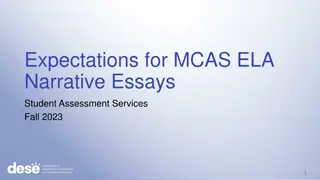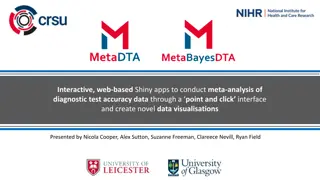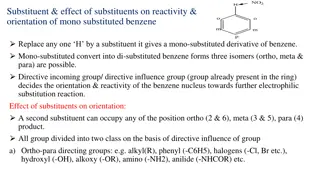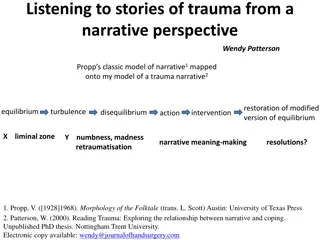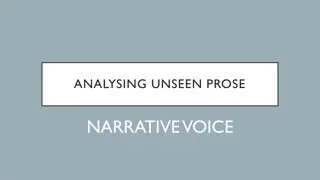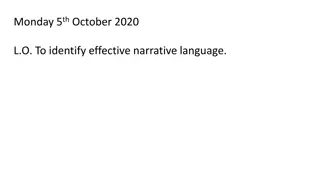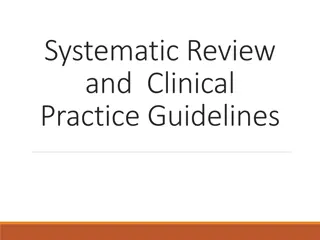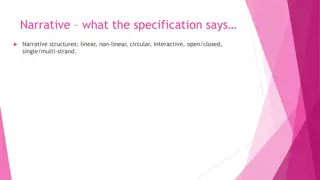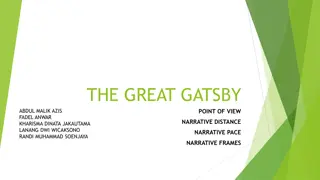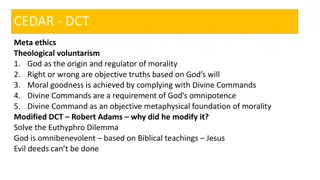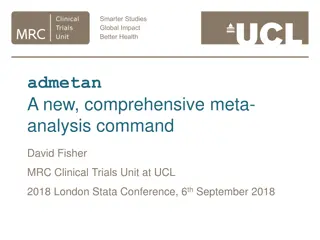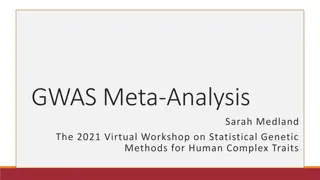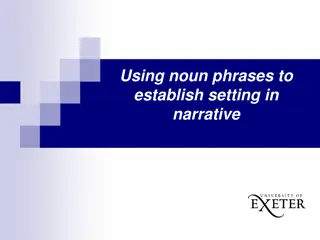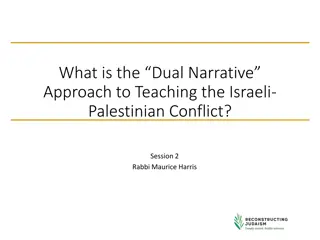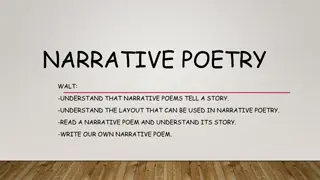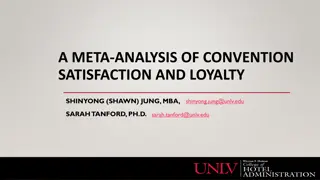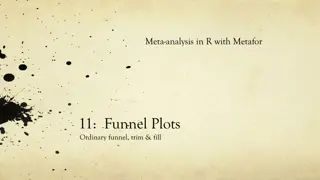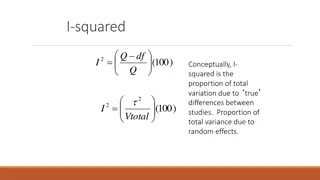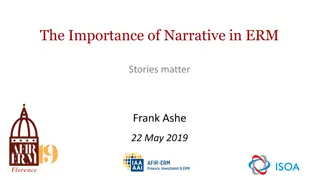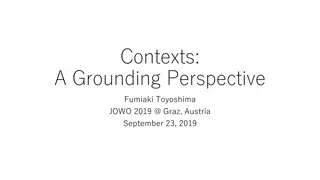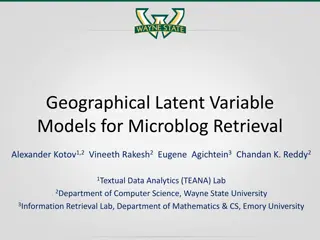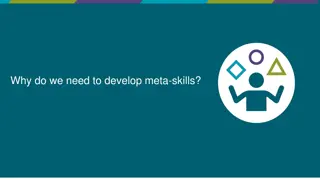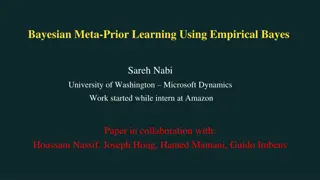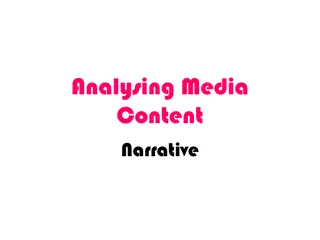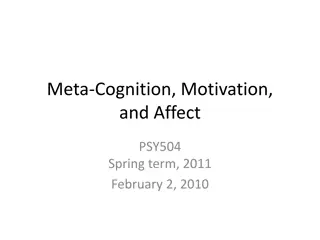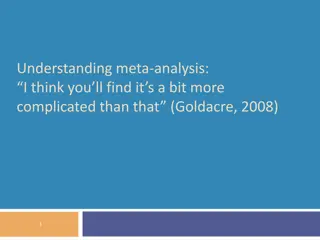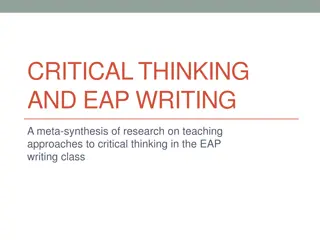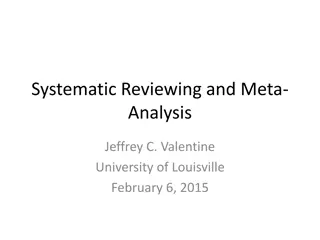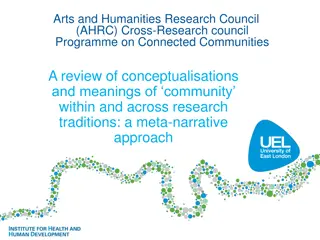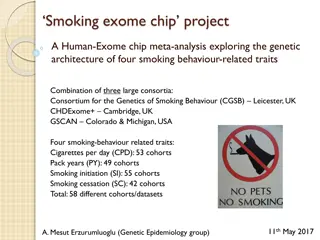Introduction to Meta-analysis in Stata
This workshop, presented by Dr. Christine R. Wells from UCLA, provides an in-depth exploration of meta-analysis in Stata. Participants will learn about systematic reviews, data collection and organization, running meta-analyses, interpreting results, creating graphs, and identifying biases. The focu
2 views • 181 slides
MCAS ELA Narrative Essay Expectations and Examples
Learn about the expectations for MCAS ELA narrative essays, including guidelines for idea development and conventions. Find out how to score well by responding in the correct writing mode and avoiding common mistakes. Explore examples of lower-score responses and how to improve them. Download sample
3 views • 10 slides
Interactive Web-Based Shiny Apps for Meta-Analysis of Diagnostic Test Accuracy
Explore interactive Shiny apps presented by Nicola Cooper and team for conducting meta-analysis of diagnostic test accuracy data with a point-and-click interface. Find educational primers, principles, and tools to enhance evidence synthesis methods and visualization in healthcare.
2 views • 22 slides
Substituent Effects on Benzene Reactivity and Orientation
Substituents in benzene derivatives influence reactivity and orientation in electrophilic substitution reactions. They can be classified as ortho-para directing or meta directing based on their effect. Ortho-para directing groups increase electron density and activate the ring, while meta directing
7 views • 14 slides
Introduction to Three-Level Meta-Analysis Models in R: A Practical Example
Explore three-level meta-analysis models in R with a focus on the association between paternal anxiety and child emotional problems. Learn to prepare data files, fit models using the rma.mv function in metafor, and understand the structure of the formula for random effects. Follow along with a step-
7 views • 22 slides
Understanding Trauma Narratives: A Narrative Perspective
Exploring trauma narratives through the lens of Wendy Patterson Propp's classic narrative model, this study delves into the restoration of equilibrium, the disruption of disequilibrium, and the intervention actions within the liminal zones of trauma narratives. It emphasizes narrative meaning-making
5 views • 5 slides
Understanding Narrative Perspective in Unseen Prose Narratives
Explore the narrative voice in unseen prose narratives through the analysis of different narrative perspectives, such as homodiegetic and heterodiegetic narrators. Understanding these terms helps in interpreting the impact of perspective on storytelling and themes in literary texts for exam preparat
1 views • 17 slides
Exploring Effective Narrative Language for Writing Success
Delve into the art of crafting compelling narratives by identifying and utilizing effective narrative language techniques. Explore the elements that make a good narrative, practice identifying literary techniques, and understand the impact of figurative language on storytelling. Enhance your writing
0 views • 42 slides
Understanding Systematic Reviews, Meta-analysis, and Clinical Practice Guidelines
Explore the importance of systematic reviews, critical appraisal questions, meta-analysis, and clinical practice guidelines in the healthcare field. Learn about the process of appraising systematic reviews, the significance of meta-analysis, and the benefits of following clinical practice guidelines
1 views • 16 slides
Exercise in Narrative Style Transformation
Practice transforming narrative styles in storytelling through a series of examples where dialogues are rewritten into narratives. The exercises focus on changing direct speech into indirect speech while maintaining the essence of the original conversations. Each task presents a scenario followed by
1 views • 26 slides
Understanding Narrative Research Design in Qualitative Research
Narrative research is a qualitative research approach that focuses on sharing individuals' stories. Researchers collect and interpret personal narratives to understand individual experiences. Key characteristics, data collection methods, steps, and ethical considerations in narrative research are ex
0 views • 20 slides
Understanding Narrative Structures in Media: Linear vs. Non-Linear
Explore the concepts of linear and non-linear narrative structures in media storytelling, analyzing how they are used to engage audiences effectively. Dive into well-known stories like Alice in Wonderland, Hansel and Gretel, and Jack and the Beanstalk to understand the difference between narrative a
0 views • 17 slides
Understanding Narrative Elements in "The Great Gatsby
Explore the narrative elements in "The Great Gatsby" such as point of view, narrative distance, and narrative pace. The novel is analyzed from chapters 5 to 9, focusing on Nick Carraway's first-person perspective and the small narrative distance, which adds realism to the story.
0 views • 11 slides
Exploring Meta-Ethics: Understanding Ethical Principles
Meta-ethics delves into the nature and validity of ethical statements, examining the meaning of right and wrong and the basis for moral claims. It explores distinctions between descriptive and normative ethics, cognitive and non-cognitive perspectives, and various ethical approaches such as naturali
0 views • 34 slides
Comprehensive Overview of Admetan: A New Meta-Analysis Command
This meta-analysis command, Admetan, introduced by David Fisher from MRC Clinical Trials Unit at UCL, offers a comprehensive analysis of combining results from independent studies. It builds on the history of meta-analysis in Stata and aims to enhance capabilities for researchers. Admetan provides f
0 views • 19 slides
Meta-Analysis in GWAS: Methods and Applications
Meta-analysis in GWAS involves combining data across studies to estimate overall effects, explore cohort differences, improve power, and replicate findings. It includes joint vs. meta-analysis, methods, and types such as fixed effect and random effect meta-analyses.
0 views • 20 slides
Meta-Evaluation of Private Sector Interventions in Agribusiness: Impacts and Methodologies
This meta-evaluation study explores the impact of access to finance and farmer/business training interventions on agribusiness indicators. It discusses the methodologies used in evaluations, highlighting the use of randomized control trials and quasi-experimental methods. Findings provide insights i
0 views • 25 slides
Understanding Narrative Stories and Plot Structure
A narrative text is a story composed of various elements such as characters, setting, conflict, events, climax, and resolution. The structure of a narrative story can be dissected into parts like beginning, middle, and end, each serving a specific purpose in storytelling. By plotting the story on a
0 views • 13 slides
Meta's Role in Amplifying Anti-Rohingya Hate on Facebook
The investigation findings reveal Meta's failure to address hate speech and incitement against the Rohingya people on Facebook, resulting in a platform that amplified and promoted harmful content. Despite admitting in 2018 that more needed to be done, Meta's business model of data collection and eng
4 views • 7 slides
Exploring Setting Through Noun Phrases in Narrative Descriptions
Establishing setting in narrative through the use of descriptive noun phrases is crucial for creating a vivid and immersive atmosphere. By carefully selecting and arranging nouns, authors can evoke specific moods and engage readers in a detailed visual experience. This approach enhances the overall
1 views • 6 slides
Teaching the Israeli-Palestinian Conflict: Dual Narrative Approach with Rabbi Maurice Harris
Explore the innovative Dual Narrative Approach in teaching the Israeli-Palestinian Conflict, as discussed in a session led by Rabbi Maurice Harris. The session covers opening prayers, reflections on readings, strategic planning, and potential challenges in implementing the approach. Participants eng
0 views • 20 slides
Dive into Narrative Poetry
Explore the essence of narrative poetry by understanding its storytelling nature, layout, features, and common poetry techniques. Delve into an example poem, "Skippy the Naughty Kangaroo," to grasp the main characters, narrative elements, and the story it conveys. Through this journey, you'll enhanc
0 views • 11 slides
Meta-programming in Haskell: A Closer Look at Splices and Quotations
Explore the world of meta-programming in Haskell through splices and quotations. Learn about successful extensions introduced by Simon Peyton Jones and Tim Sheard, including practical examples like generating source code using splices that are type-checked and compiled at compile time. Dive into con
0 views • 45 slides
Meta-Analysis of Convention Satisfaction and Loyalty Trends
This meta-analysis explores the relationship between attributes, perceptions, satisfaction, and loyalty in the convention industry. It highlights key findings from multiple studies using statistical methods to analyze attendee satisfaction and loyalty factors. The study emphasizes the importance of
0 views • 11 slides
Exploring Funnel Plots in Meta-analysis with Metafor in R
Funnel plots in meta-analysis help assess distribution symmetry, heterogeneity, and publication bias. The trim and fill analysis with Metafor in R examines data transformations, imputes missing values, and performs sensitivity analysis through re-computing funnel plots.
0 views • 4 slides
Understanding Prediction and Confidence Intervals in Meta-Analysis
Conceptually, I-squared represents the proportion of total variation due to true differences between studies, while Proportion of total variance is due to random effects. Prediction intervals provide a range where study outcomes are expected, unlike confidence intervals which contain the parameter's
0 views • 26 slides
Exploring the Future Role of State Governance through Meta-Governance and Political Leadership
Governance research perspective discusses the evolving role of the state in mobilizing public and private actors through interactive forms of governance. Meta-governance theory emphasizes the governance of governance, with a focus on interactive governance arenas. Recent theories of political leader
0 views • 11 slides
Interactive Microbiome Data Analysis with Parallel-Meta Suite
Conduct interactive and rapid microbiome data analysis on various platforms using Parallel-Meta Suite. This software, developed by a team from Qingdao University, simplifies the process from installation to verification. Utilize the step-by-step guide to download, install, and verify the software to
0 views • 13 slides
The Power of Narrative in ERM and Economics
Narrative plays a crucial role in risk management, as it helps in better understanding and decision-making. The use of stories in risk dashboards and economic narratives can convey complex information effectively. Robert Shiller's concept of narrative economics explores how popular stories impact ec
0 views • 27 slides
Understanding Contexts: A Meta-Ontological Approach
Ontologies provide a general representation of reality, but knowledge is mostly context-dependent. Analyzing different types of contexts, from linguistic to manufacturing, remains a challenge. This study aims to deepen the understanding of the ontological nature of contexts by leveraging a meta-onto
0 views • 14 slides
Geographical Latent Variable Models for Microblog Retrieval
Addressing challenges in microblog retrieval such as vocabulary mismatch and multi-faceted relevance signals. Explore opportunities in leveraging lexical and non-lexical information, including geographical meta-data. Discuss prior work on utilizing timestamps and re-tweets, while also highlighting t
0 views • 19 slides
Developing Essential Meta-Skills for Personal Growth
Enhancing meta-skills such as focusing, initiative, integrity, adapting, collaborating, leading, communicating, and feeling is crucial for personal development. These skills enable individuals to maintain concentration, make confident decisions, uphold ethical values, embrace change, build relations
0 views • 14 slides
Bayesian Meta-Prior Learning Using Empirical Bayes: A Framework for Sequential Decision Making Under Uncertainty
Explore the innovative framework proposed by Sareh Nabi at the University of Washington for Bayesian meta-prior learning using empirical Bayes. The framework aims to optimize ad layout and classification problems efficiently by decoupling learning rates of model parameters. Learn about the Multi-Arm
0 views • 27 slides
Understanding Narrative Structures in Media Content
Narrative in media content involves how stories are told, focusing on structure and conventions. Key elements include Todorov's narrative theory, basic narrative structures, and Propp's character spheres of action, all of which shape the way stories unfold in films and other media.
0 views • 13 slides
Enhancing Understanding of Meta-Cognition, Motivation, and Affect in Psychology Classes
The content discusses survey responses and feedback on a psychology class focused on meta-cognition, motivation, and affect. Students shared insights on the best and worst parts of the discussions, highlighting the importance of staying on topic. The format of lectures followed by discussions was al
0 views • 53 slides
Understanding Meta-Analysis: A Comprehensive Overview
Meta-analysis is a technique that combines results from various studies by converting them to a common measure, typically effect size. It faces challenges due to variations in population variability, selection of studies, and sensitivity of outcome measures. Factors like age, population characterist
0 views • 12 slides
Enhancing Critical Thinking in EAP Writing: A Meta-Synthesis Study
Investigating the teaching approaches to critical thinking in EAP writing classes, this meta-synthesis research delves into the importance of critical thinking, key issues in the literature review, defining critical thinking, enhancing criticality in academic writing, and understanding critical thin
0 views • 14 slides
Understanding Systematic Reviewing and Meta-Analysis
Explore the significance of systematic reviewing and meta-analysis in research literature, including definitions, options for conducting reviews, and reasons for the shift away from narrative reviewing. Discover the essential principles and future directions of systematic review practices.
0 views • 52 slides
The Evolution of Community Conceptualizations Across Research Traditions
This research review explores the changing conceptualizations of community over time within and across different research traditions, employing a meta-narrative approach. It delves into how community discourse has evolved, its implications for academic and policy development, and the methodologies u
0 views • 19 slides
Genetic Architecture of Smoking Behavior Traits: Meta-Analysis Insights
Exploring the genetic basis of smoking behavior-related traits through a meta-analysis combining data from three large consortia across 58 different cohorts/datasets. The study investigates genetic variants associated with cigarettes per day, pack years, smoking initiation, and smoking cessation. Ov
0 views • 34 slides

